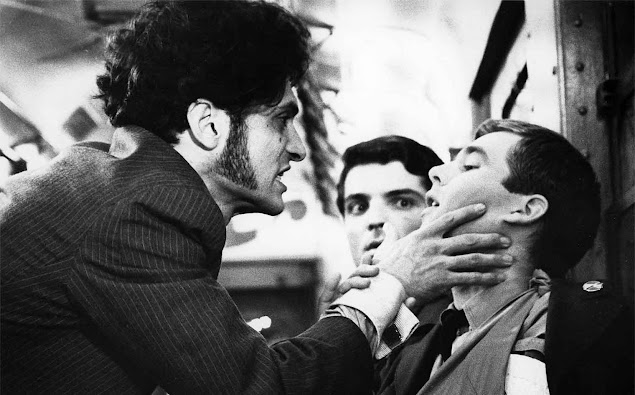The Incident
S P O I L E R S
"Welcome to New York", and what that implied in earlier years might be the ultimate message of 1967's relentlessly gritty THE INCIDENT, a film that illustrates sociology more effectively than many other motion pictures of its time. Long after its release, stories rang from the Associated Press of unfortunate New Yorkers who were accosted as onlookers froze and did nothing to help them. Seinfeld even spoofed the so-called "Good Samaritan Law" in its controversial series finale. But....I'm certain that John Q. Public would (frequently) behave much the same in Nebraska. Or South Dakota. Many people don't want to get involved. Possibly even in small towns where everyone knows everyone's business. People have choked to death because even those certified to perform the Heimlich were afraid to get sued.
We want to believe the opposite. That inside we are all heroes, always ready to assist our fellow man. We watch movies like THE INCIDENT and are appalled that a couple of dirty punks get away with harassing people with no retribution. For awhile, anyway. We might even yell at the screen, telling the nebbish to rise up and face that scum who is terrorizing his wife. But he shrinks back. He's just a history teacher, content in his lot, even as that wife had repeatedly berated him for not being more ambitious. Maybe he isn't too disturbed when she gets violated.
Just like the African American guy. A militant who talks a big game to his wife about Whitey. The Man and how he has long oppressed the Negro. The militant mocks his wife for her social work and berates a token clerk for deliberately pushing a coin to fall on the ground for our "hero" to pick up. How does he act when two punks bully passengers of all ages on that fateful train ride? He at first cheers on the two lowlifes, giving the white man what he thinks they deserve. But then it's his turn to be harassed. Will he defend his wife?
THE INCIDENT spends its second half on a subway car as the two assholes in question (Tony Musante and Martin Sheen, in their screen debuts) take over and berate everyone to the potential breaking point, yet no one stands up for themselves or others. Prior, director Larry Peerce's film introduces us to each passenger prior to boarding. Younger couples, older couples, a couple with a small child. A recovering alcoholic. A homosexual man. Disaffected New Yorkers who are likely shielded from the reality of the streets, who always turn the other way from the homeless and the multitude of panhandlers. Another on the train is a soldier from Oklahoma (Beau Bridges), who doesn't share the others' jadedness (including that of his military buddy). He too is harassed and mocked, and having his arm in a cast is no help. Um, well, actually...
The movie is grim, grim, grim. Uncomfortable in the extreme at times. Really hold viewers in a grip, and admirably never gives them an escape hatch, or any relief. Gearld Hirschfeld's cinematography, in its B & W graininess, appropriate captures middle of the night NYC more than vividly. Some subways station exteriors were captured guerrilla style, with cameramen hiding their whirring eyes in their jackets. The film's theatrical origins are evident and its claustrophobia really suits the material.
Mustane burns up the screen, sometimes going over the the top with Sheen but usually maintaining a realistic, terrifying menace. He's a purveyor of character, and perhaps accurately sizes up each rider. He taps into fears, prejudices and desires in a way a psychoanalyst might if he were an aggressive thug. His method is far from therapeutic. A long awaited moment of just desserts, served ice cold, does finally arrive, but there will be no true, satisfying catharsis for the victor. Only more indifference from those around him, even his own compadre. Welcome to New York. Welcome to the human race.



Comments